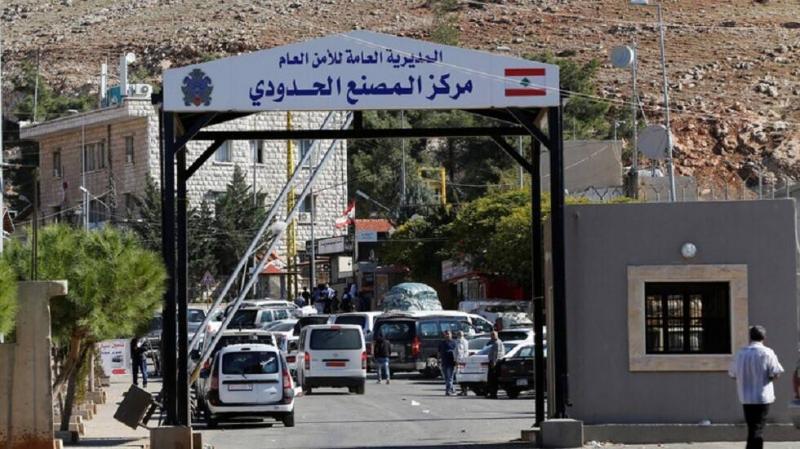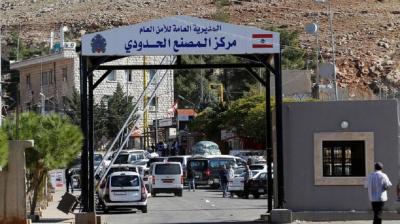Both Lebanon and Syria have tried to contain the confusion that followed the announcement of the postponement of an official Lebanese delegation's visit to Damascus to discuss maritime border demarcation with Syria. This issue adds to the many outstanding border files that have been unresolved for nearly fifty years in Lebanon, which involve more than twenty disputed land border points located in overlapping geographical areas, in addition to the ongoing dispute over the Shebaa Farms and Kfarshouba Hills in southeastern Lebanon at the tri-border area with Israel.
After Lebanon announced that an official delegation would visit Syria on Wednesday, a Lebanese diplomatic source stated on Monday that the Syrian government sent a message to the Lebanese Foreign Ministry stating that Damascus had apologized, and that Syrian officials had prior commitments without mentioning a new date. This led to confusion about setting a date for the Lebanese delegation. Syrian ambassador to Lebanon Ali Abdul Karim Ali stated yesterday after meeting with Lebanese President Michel Aoun that the date "was not canceled but rather agreed to later, as the schedule in Syria was full after the date was set for Wednesday, and prior commitments existed." Ali downplayed the potential complexities by stating that "there is a treaty of brotherhood and cooperation between the two countries, and Syria is always committed to it, even regarding outstanding issues, so these matters are always easy and facilitated." Aoun awarded the Syrian ambassador the National Cedar Medal with the rank of Grand Officer on the occasion of the end of his diplomatic missions in Beirut.
Additionally, some Lebanese parliament members have noted that Damascus does not want to demarcate the borders. Fadi Karam, a member of the "Strong Republic" bloc, mentioned that "the Syrian regime sent a complaint to the United Nations in 2014 objecting to Lebanon defining its northern maritime borders in 2011, and it did not send documentation to confirm the Lebanese claim to the Shebaa Farms in response to Lebanon's request. It refuses to demarcate the borders, does not recognize Lebanon's sovereignty, does not stop smuggling, nor does it recover displaced persons."
The signs of the border dispute appeared in the north when a decree defining Lebanon's exclusive economic zone was issued in 2011, which included lists of coordinates for the boundaries of this zone from the southern, western, and northern sides. Lebanon unilaterally defined border point number (6) and sent it to the United Nations in 2010, revising it in 2011 by affirming point number (7), subsequently informing the United Nations about it, along with defining the southern maritime point number (23). After Lebanon unilaterally and temporarily demarcated the northern boundaries of its exclusive economic zone, Syria engaged in a similar action by claiming ownership of a part of the economic zone belonging to Lebanon. Damascus objected to Lebanon's unilateral demarcation of its northern exclusive economic zone by sending a letter of protest to the United Nations in 2014.
The maritime border dispute between Lebanon and Syria surrounds an area exceeding 750 square kilometers, according to informed Lebanese sources, explaining that in northern Lebanon "the Lebanese established the border line, while the Syrians marked a preliminary border line extending horizontally from the coast westward, which Lebanon opposes, resulting in the dispute covering approximately one thousand square kilometers of maritime territory."
The problem escalated in 2021 when the Syrian Ministry of Oil signed a contract with the Russian company "Capital," granting the Syrian state exclusive rights to explore and develop oil in offshore block number (1) in Syria's exclusive economic zone in the Mediterranean Sea, adjacent to the coast of Tartous Governorate, up to the Syrian-Lebanese maritime border, covering an area of 2250 square kilometers. The Syrian block number (1) overlaps with the Lebanese blocks number (1) and (2), leading to a clear border dispute.
Demarcating the borders with Syria has historically remained unresolved, despite attempts made through joint committees in the 1970s for land border demarcation, while no efforts were made for maritime border demarcation. All efforts stalled during the Lebanese Civil War from 1975 to 1990, and no official joint committee was formed to demarcate the borders after the war, except when the issue of land border demarcation between Lebanon and Syria was first brought to the discussion table by President Nabih Berri in the Lebanese Parliament in the spring of 2006, aiming to delineate the shared borders between the two countries over 357 kilometers. The border demarcation remained stalled, despite the establishment of a joint committee tasked with demarcating the borders after the then Prime Minister Saad Hariri visited Damascus in 2010.
Lebanon initiated the formation of a security and political committee chaired by the then Minister Jean Ogassapian, which was equipped with documents and maps, including aerial surveys detailing the borders between the two countries. However, Damascus did not engage with the Lebanese committee for border demarcation, and Syrian authorities claimed they were preoccupied with demarcating borders with Jordan, according to Lebanese officials.
In addition to these outstanding points, the Shebaa Farms and Kfarshouba Hills, which are occupied by Israel, represent a political and geographical dilemma. Lebanese officials who accompanied the border demarcation attempts have stated that Damascus did not respond to Lebanon's request in 2010 to provide maps and documents to assert Lebanese ownership of the farms.




